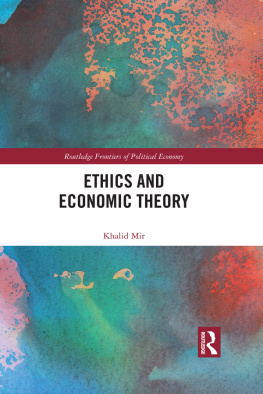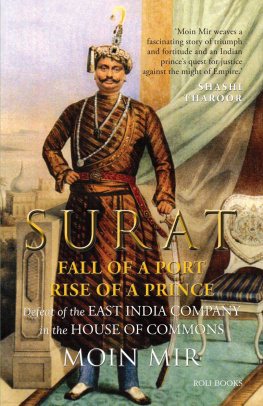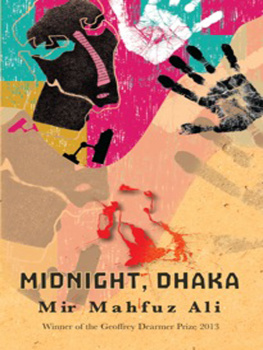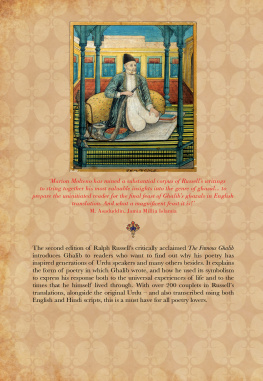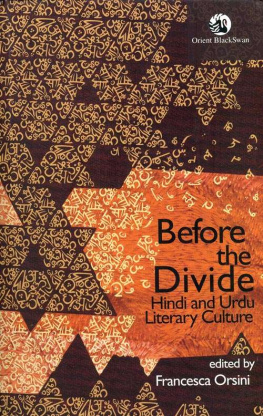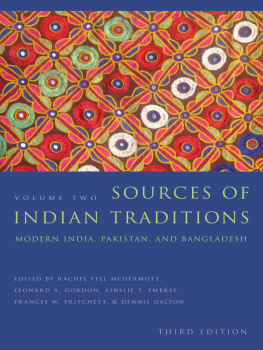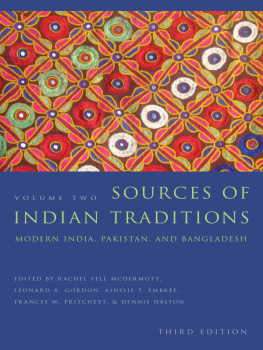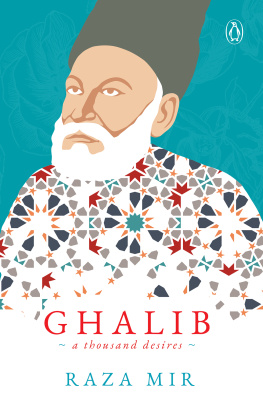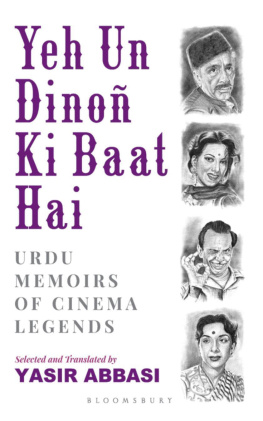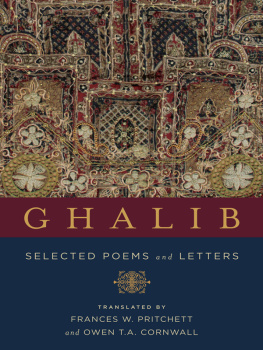Raza Mir teaches management at William Paterson University, USA. He is the co-author of
. He can be reached at urduwallah@gmail.com .
Foreword
Urdu is a nation unto itself. Wherever it travels, it creates its own world. It was born in India, but does not belong to India alone.
It is the official language of Pakistan, but does not belong to Pakistan alone. When it reached Oslo (Norway), it settled there. It went to Great Britain, and created its own home. It reached Canada, and a community emerged. It reached the United States, and became a native tongue. For it was embraced by Raza Mir.
The truth is that instead of embraced, if we could use a different metaphor, we would say adopted by lips. Wherever Urdu goes, it clasps people in a bear hug. It becomes a tradition unto itself. For Urdu is after all, the lingua franca of a culture.
Urdu
Ye kaisa ishq hai Urdu zaban kaMaza ghulta ha lafzon ka zaban parKe jaise paan mein mehnga khimaam ghulta haiNasha aata hai Urdu bolne meinGilori ki tarah hain moonh lagi sab istelaahenLutf deti hainHalaq chhooti hai Urdu toHalaq se jaise mai ka ghoont utarta haiBadi aristocracy hai zaban meinFaqeeri mein nawaabi ka maza deti hai UrduAgarche maani kam hote hain aur alfaaz ki ifraat hotihaiMagar phir bhi...Buland aawaaz padhiye to bahut hi motabar lagtihain baateinKahin kuchh door se kaanon mein padhti hai agar UrduTo lagta haiKe din jaadon ke hain, khidki khuli hai, dhoop andaraa rahi haiAjab hai ye zaban UrduKabhi yoonhi safar karteAgar koi musafir sher padh de Mir, Ghalib kaVo chaahe ajnabi hoYahi lagta hai vo mere vatan ka haiBade shaista lahje mein kisi se Urdu sun kar kyanahin lagtaKe ek tehzeeb ki aawaaz hai Urdu!!Janaab Raza Mir, Urdu mein aap ka hissa yaadrahega.Urdu
What is this love of Urdu That the taste of words dissolves on the tongue Like expensive tobacco dissolves with a bite of paan? Urdu speech produces a mellow high, Like the many flavours of a delectable morsel of betel That frolic in the mouth. When Urdu touches the throat It descends like a sip of wine.
A strange aristocracy it possesses That, even in penury, Urdu yields a sense of immense prestige. Though, at times, there is a paucity of meaning And a surfeit of words, But even so... When declaimed in a firm voice, words appear weighty and solemn When Urdu reaches the ears from a distance It appears As if on winter days, the window is open and sunshine is pouring in. Strange is this Urdu tongue That, when on a journey, Should a wayfarer declaim a couplet from Mir, from Ghalib, Be that a complete stranger He still appears a compatriot. Does it not feel That the lingua franca of a culture is this Urdu! Janaab Raza Mir, I will remember your role in Urdu. Gulzar
Preface
This is first and foremost a gift for my wife Farah.
It was she who laid out the idea of this book for me in detail, as a volume that would not only help her dip her toe in the vast ocean that constituted Urdu poetry, but also provide her with an entry point into the language itself, with its occasionally intimidating metaphors and linguistic peculiarities. Like Farah, I know a lot of people whose interest in Urdu poetry vastly exceeds their ability to engage with it, partly because of their unfamiliarity with the script, but also because of its often mystifying and outsider-unfriendly albeit tantalizing metaphorical conventions. Indeed, I am one of them. In school, I formally studied Hindi and Telugu, and despite Urdu being my putative mother tongue, I never engaged with it (except orally) till I was in my teens. It is only my unhealthy obsession with Urdu poetry that finally forced me to teach myself the Urdu script, and resolve the helplessness I felt when the joy of hearing a good poem was rendered ephemeral by my illiteracy. While my ineptitude with regard to Urdu poetry has been happily resolved, it obviously persists in other theatressuch as when I attend a Carnatic music concert, and watch the cognoscenti among the listeners keep beat with their palms and speak of kritis and adi-taalam, while all I can say is That sounded nice! I would also love to read a good book on relatively alien cultural traditions, albeit one that is not too dense and impenetrable, with lines like: One margam of Bharatanatyam consists of allaripu , jatiswaram , sabdam , varnam and tillana .
I hope I will not bamboozle you in this book with unexplained references to radif , qafiya , musaddas or such technicalities. This book seeks to enhance your affective enjoyment of Urdu poetry, with as little interference from me as possible. The intended readership of this book does not necessarily comprise Urdu experts or those who have read a lot of Urdu poetry in the original. Rather, I visualize an intelligent reader who, while interested in poetry as a genre, may not have a working knowledge of the Urdu script, and may not even be familiar with or fluent in Devanagri either. They would have read poetry in English and other languages to varying extents, but their exposure to Urdu might primarily be oral (Indian film songs, CDs of ghazals and poetry, the company of Urdu-literate friends). They do enjoy the spoken cadence of the language, but might have been deprived of the non-trivial pleasure that comes from a reflective reading of the poems.
In this anthology, I have attempted to provide an entry point to Urdu poetry for such interested non-insiders. To these readers, I offer a quasi-formal introduction to the canon and the contemporary landscape of Urdu poetry, with a highly arbitrary and subjective selection of around 150 poems from approximately fifty poets. Many of these poems have been abridged due to space considerations. I begin with a brief historical essay on Urdu and Urdu poetry (which is quirky, idiosyncratic, contingent and incomplete, but hopefully interesting) before laying out my selection of poems. I am also happy to offer a brief Internet roadmap of websites where one can read more about the poets and find more translated work. I have also identified websites in the public domain where these poems can be heard and viewed as performance.
I have included biographical notes on the poets, which are not meant to be exhaustive, but just an attempt to render them human enough. The poets are ordered chronologically; and while I have chosen the list with care, there will obviously be omissions, of poems and poets, that some readers will consider unforgivable. If reviewers of this book express anger over the fact that I overlooked certain poets, poems or verses (or was foolish enough to include some lightweight in this august company), I will be delighted. For in my wilder dreams, I envisage a series of sequel anthologies, like a good B-grade Hollywood horror film franchise, which people will disparage, but will be drawn to, as if to unhealthy street food. So do drum up the outrage. I briefly considered ignoring Ghalib in my selection to ensure such a backlash, but there is a line between quirkiness and insanity that even I am aware of! I would also like to eschew any claims of genre-originality.


